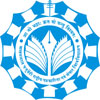
Study on Influence and Impact of Facebook Political Advertisement Content on Youth
Junny Kumari
Abstract:
The objective of this study is to analyze the impact of Facebook on politics and political campaigns. It explores how Facebook’s extensive user base and targeted advertising capabilities are advantageous for political groups. However, it also addresses concerns regarding the potential spread of misinformation and discrimination. The study emphasizes Facebook’s efforts to address these concerns, such as establishing an independent content review group and increasing transparency in political advertisements. Nevertheless, it suggests that further measures may be necessary to ensure fair and unbiased political communication. The study examines the opinions and behaviors of Facebook users, particularly focusing on the youth demographic. It raises concerns about the platform’s influence on the dissemination of political information and the need for ethical, legal, and social discussions on Facebook’s impact on political discourse and outcomes.
Key Words: Political Advertisements, Facebook, Youth, Impact, Political Parties.
Introduction:
Facebook is a powerful global platform that connects people worldwide. Not only does it serve as a space for chatting with friends and sharing photos, but it also stands as one of the largest social media platforms with billions of users as of 2021. Consequently, it has become an influential tool for political campaigns, politicians, and individuals to engage with their followers and constituents. Facebook plays a significant role in politics by providing a platform for political communication and mobilization. Political parties and candidates utilize Facebook to connect with voters, share their message, raise funds, and organize events. By leveraging demographics, interests, and past behavior, campaigns can target specific voter groups and reach a wide audience, with digital media serving as a game-changer for political parties and organizations. Facebook’s impact on politics extends beyond connectivity, shaping and influencing the outcomes of elections worldwide. However, it is important to note that the impact of Facebook on politics is not entirely positive. Alongside its user base, Facebook also harbors the promotion of any content on it.
Facebook’s extensive size and global reach provide political groups with the ability to precisely target specific segments of voters using personalized messaging. However, there are concerns regarding the potential for misinformation and discrimination. Users on Facebook have the means to express their political opinions through various actions, such as posts, likes, comments, and shares, which can significantly influence the viewpoints of their friends and followers. This phenomenon can lead to an amplification effect, where political messages and narratives spread rapidly across social networks. In an attempt to address these concerns, Facebook has established an independent group to review content decisions and has increased transparency in political advertising. Despite these efforts, some individuals believe that further measures should be taken to ensure fair and impartial political communication on the platform.
Review of Literature:
Exploring Political Parties on Facebook: Literature Review of the Two Main Political Parties in Ghana (June 2021)
Author – John Demuyakor (University of Professional Studies Accra)
The social media political used various way to promote the political parties and politics this socio political engage the wide population in the democratic country like Ghana , two dominant parties of Ghana like NPP and NDC accepted that social media is a platform help them to reach the mass audience of ghanians , but in the most part of Ghana is suffering from the illiteracy and poverty and also the because of limited internet service the ghanians political parties are highly rely on the traditional media like TV, radio and print etc. Many scholars and other intellectual people believe that social media platform front runner for the political parties.
The elements of political communication on Facebook
February 2020 Authors: TănaseTasenţe (UniversitateaOvidiusConstanţa)
Facebook is a platform for political parties, candidates and also the political organization supporters who post the video, images, captions to promote there political parties they also use the pole or the open ended session where the audience give there feedback and opinion its design in such a way where the large number of audience reach the post and discuss its opinion to other. Facebook has a significant advertising reach which is very effective to reach its large audience.
Facebook having such software where the political parties choose the location and filter their audience so they can promote their parties. Facebook facilities is the creation of political group that allowed the people to connect with each other and discuss political issue Facebook allow candidates and political parties so they can create a special event and promote the event and invite their followers supporters and general public to attend the rallies so the online as well as the offline promotion take place and the political organization connect with people.
Role of social media in the changing face of indian politics: a study with special reference to facebookjune 2020
Authors: MayankSaxena,Deepak Kumar Adhana (Lingaya’s University)
Facebook has a significant role in the Indian politics in the modern era in 2014 Lok Sabha election where the first social media election for 1.2 billion strong elections were the first social media election for 1.2 billion strong India with the advent of Social Media giants in India, namely Facebook and Twitter, whose users run into million from urban areas to rural areas. The members of Facebook set an election integrity team in the India to ahead the election.
After 2014 elections social media uplift field of PR communication and marketing specially in those area where traditional media is the only mode of promotion such as TV , radio , newspaper. In the 2017 election the voting process and its demographic where the torn between the urban and the rural areas categories the voting and we see how the social media change the shape of India.
Facebook as a Source of Political Information in PolandDecember 2022
Authors: Jakub Jakubowski, Denis Halagiera, AgnieszkaStępińska( Adam Mickiewicz University)
Facebook as a source of political information for polish media user it provide a platform for the audience where they can express their political views engage discussion we see the drastical change in the Poland poltics through the social media where the number of political news consumption in Poland is because the technology as well as the number of mobile device are rising about 74.8% people of Poland having smartphone where 97% of them are use the social media in the mobile device and 96.2% users are highly active on the Facebook, It gain its position where now Facebook having a huge data of public and their opinions about there political overview. Facebook provides space and opportunity to share the information and build the trust between the people. On the other hand its algorithm can turn the Facebook harmful tool where it can manipulate the public opinion,
Activation: Social media platforms like Facebook serve as powerful tools for political mobilization and activation. Political campaigns can use Facebook to organize rallies, fundraising events, and volunteer activities, increasing awareness and support for particular causes or candidates. Facebook have its negative aspects such as the spread of misinformation and polarization, it also has its positive aspects such as opportunities for engagement, increased transparency and activation. As with any platform, it is up to the users to be responsible in their social media activity, especially when discussing political issues.
Research Objectives:
1. Analysing the perspective of user on the political advertisement content on facebook
2. To find the effects of the political campaigns on the youth of the nation.
3. Facebook is emerging as an influential platform for political contet
Research Methodology:
This Research study is based on descriptive research design. The study has the quantitative data analysis.
The universe for the study is the facebook users. The sampling has been done with purposive random sampling technique. The sample selected for the study was 100 and response collected was 79. The entire study is done on Primary data. The data collection tool was questionnaire. The questionnaire was circulated via Google form. Therefore online data collection was done to cover wider horizons of response.
Data Analysis & Interpretation:
Graphical Presentation:
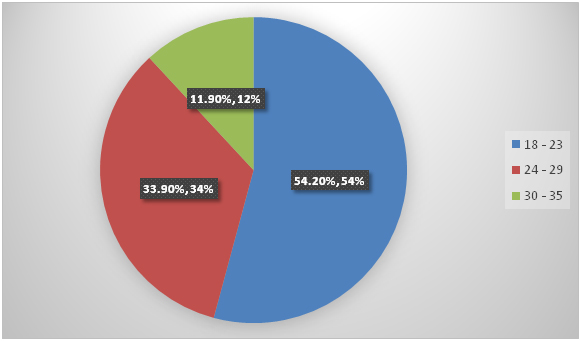
1. Age group
Out of all respondent 54.20% belonged to the age of group 18-23 where 33.90% belonged to the age of 24-29 and 11.90 % belonged to the age of 30-35
This implies that a majority of the respondents were between the ages of 18-23 , while the smaller proportion of respondent were in the age range of 24-29 and 30-35
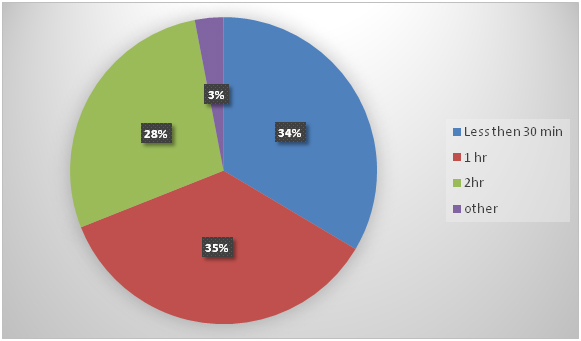
2. How much time people spend of Facebook?
Out of all the respondents the majority of people use the Facebook for almost 1 hour which is 35% where the other user use the Facebook for 30 min which is 34%
Rest the user access the Facebook for almost 2hr which is 24% . This pie-chart show that the active user of Facebook use the Facebook less than an hour.
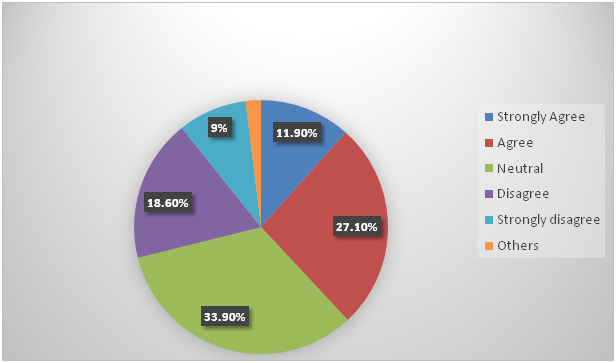
Do you think Facebook has influenced your political views
This result show that out of all respondent the majority of user feel neutral about being influenced by the Facebook where 27.10% users response on agree option, 18.60% users response on the disagree option where 11.90% user are strong agree that they are influenced by the Facebook while 9% user choose the strong disagree option.
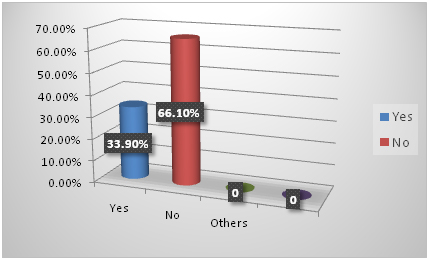
3. Have you ever engaged in political discussion or debates on Facebook.
Out of all respondent66% answer claim that are in the discussion or debates on the Facebook site. Facebook provide the messengerwhere the individual can create a group where the user can freely express there opinion or can be a part of discussion regarding politics other options are also available like comments, any page post etc. While the 34% answered that are not involved in any kind of discussion of debate on the Facebook.
4. Do you think Facebook is a reliable source for political news and information
In this study out of all the respondents 36% answered that maybe this percentage show that user are neutral where the 37% user said yes that Facebook has a potential to delivery all the information and news regarding politics on Facebook site, while 27% answered that don’t feel that Facebook is a reliable source for political information
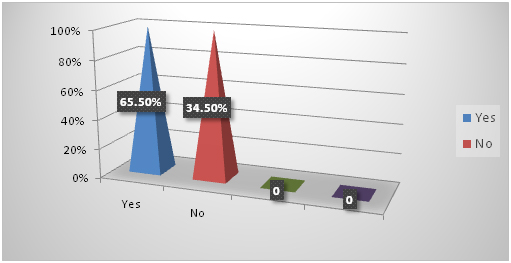
5. Do you think political campaign should be allowed to advertise on Facebook?
This result show that out of all the respondent 65% answered yes that political campaign should be allowed to advertise on Facebook site. That fact the by doing this any political party can promote there party leader or the organisation on the targeted audience while the 35% answered no that there’s no need to advertise any political campaign on the Facebook site.
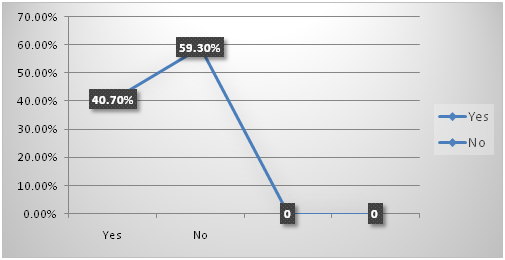
6. Have you ever reported a political post or comment on Facebook for being inappropriate?
In this study out of all the respondent 59% answered no that they didn’t find any inappropriate comment or post which lead any bad impact on the user while 41% answered yes that they noticed some inappropriate post and comment that puts negative impact on the Facebook user.
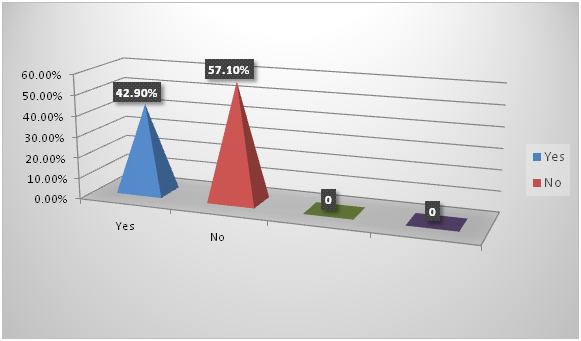
7. Have you ever received political message or calls from candidates or organization through Facebook messenger?
In this research survey out of all the respondent 53% answered no that yet the user didn’t get any kind of message or call by any political organization or party While 43% answered yes that they received message or calls regarding promotion by the political parties and the political organization.
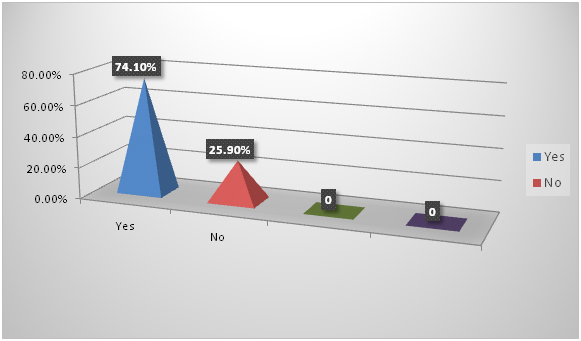
8. Have you noticed an increase in political advertisements on Facebook during election seasons ?
In this research survey out of all the respondent 74% answered yes that they have seen political ads in the Facebook interface while 26% answer no means still the rest user haven’t seen any ads on the Facebook.
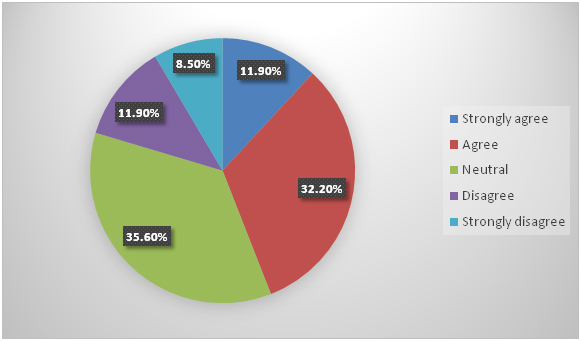
9. Do you think Facebook has a responsibility to regulate political content on its platform
In this research survey out of all the respondent 35.60% users are neutral aboutFacebookregulate of political content where 32.20% are agreeing that Facebook regulate the political content on its platform 11.90% are strong agree and 11.90% are disagree also only 8.50% users are strongly disagree that facebookis not responsible for the political content regulations.
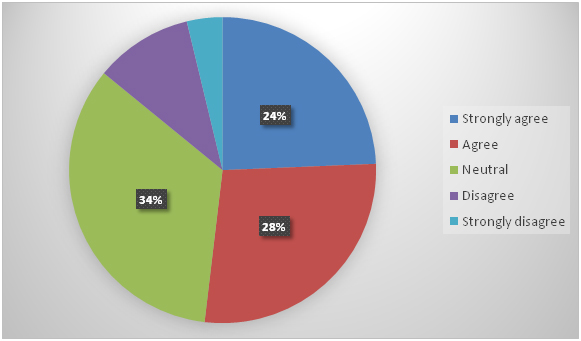
10. Do you think Facebook has a power to influence the outcome of elections ?
In this research survey out of all the respondent 34%answered neutrally that they are not agreed or disagree about the influence of Facebook in the election result outcomes,other 28% agreed that yes Facebook plays a vital role in the election outcomes. While24% users are strongly agree that Facebook not only influence and promote the political parties resultbut it’s helps the party to showcase there agenda’s and there motto in front of the social media user.
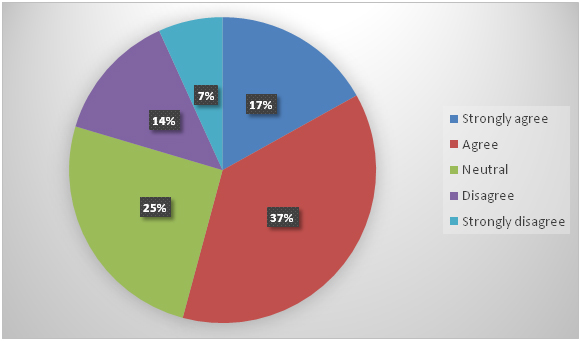
11. Do you believe Facebook plays a role in public opinions on political issues ?
In this research survey out of all the respondent 37% answered that they are agreeing the fact that Facebook is a platform for people to express their political views, engage in political discussions, and consume news and information about political issues.Other 25% are neutral about there opinion where 14% users are disagreed it show that there opinion are not influenceby the Facebook they have there own thoughts and point on the political issue.
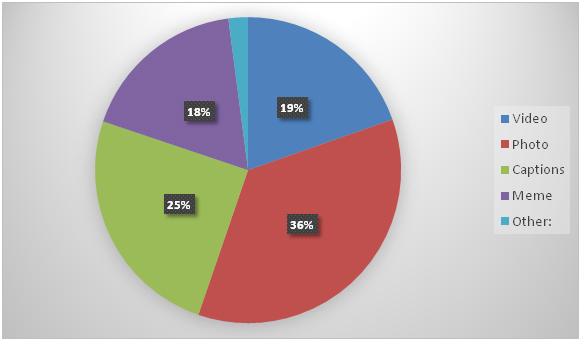
12. What kind of political content you post or share on Facebook ?
In the research Survey out of all the respondent 36% answered that they mostly post and share the photo which is related to politics where, 25% post the caption about the political parties like motto or any informational news, 19% users post or share the videos of political parties promotional video or the video where the party leader promote his agenda his message etc. Rest 18% users answered that they post and share the meme which is related to politics and mostly meme are funny.
Findings:
1. The research survey demonstrates the significant impact of online opinions on Facebook users, shaping their political views and opinions.
2. Facebook, as a dynamic social media platform, provides extensive options for political parties and organizations to effectively promote and target their desired audience.
3. During the pandemic situation, Facebook plays a crucial role in political promotion, compensating for the inability to conduct traditional rallies. It helps political parties and organizations stay relevant in the political race.
4. Both Twitter and Facebook are highly valuable social media platforms for political discussions and debates.
5. Facebook’s reliable interface and settings offer various promotion options, allowing users to choose their desired area of promotion, filter their target audience, and showcase specific content to the public. The impact of social media on political discourse is evident through these features.
Conclusion:
Facebook, a globally renowned social media platform, has become an indispensable tool for communication, networking, and marketing. It has evolved into a platform where the public can actively engage in political discussions, express their views on political matters, and access information and news related to politics. This study aims to analyze the usefulness of Facebook in politics and its impact on the general public. Notably, Facebook has emerged as a significant platform for political engagement and communication, with politicians and parties utilizing it to connect with citizens and voters. Additionally, Facebook plays a role in influencing and reshaping politics, as well as facilitating content exploration. While it enables easier participation in political discussions and debates, it also allows political parties to promote their agendas and mottoes. However, it is essential to acknowledge that Facebook has faced criticism for the spread of false information and propaganda, which can mislead the public and influence their political opinions and decisions. In this digital age, social media, including Facebook, has both positive and negative effects on politics.
Reference:
1. JakubowskiJakub, halagieraDenis, stepinskaAgnieszkaFacebook as a Source of Political Information in Poland2022 December https://www.researchgate.net/publication/367974660_Facebook_as_a_Source_of_Political_Information_in_Poland
2. TasanteTanase, The elements of political communication on Facebook 2020 February
https://www.researchgate.net/publication/339292371_The_elements_of_political_communication_on_Facebook
3. Demuyakor John, Exploring Political Parties on Facebook: Literature Review of the Two Main Political Parties in Ghana 2021 June https://www.researchgate.net/publication/349861580_Exploring_Political_Parties_on_Facebook_Literature_Review_of_the_Two_Main_Political_Parties_in_Ghana
4. Saxenamayank, andhana Kumar Deepak ,ROLE OF SOCIAL MEDIA IN THE CHANGING FACE OF INDIAN POLITICS: A STUDY WITH SPECIAL REFERENCE TO FACEBOOK June 2020, https://www.researchgate.net/publication/342162878_ROLE_OF_SOCIAL_MEDIA_IN_THE_CHANGING_FACE_OF_INDIAN_POLITICS_A_STUDY_WITH_SPECIAL_REFERENCE_TO_FACEBOOK
5. Koullokesh , Methodology of educational research , vikas publication house pvt ltd. 2009 January 1 https://zendy.io/pdf-viewer/10.1038%2F141494e0
6. Lulejack , Understanding Media and Culture: An Introduction to Mass Communication,flatworld , 2017 January 1 , https://zendy.io/search?q=Introduction%20of%20mass%20communication
